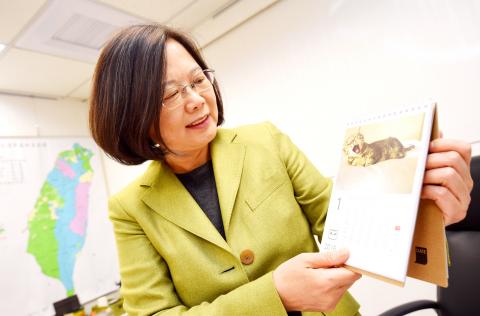Liberty Times (LT): Many people believe that cross-strait relations will be the Democratic Progressive Party [DPP] administration’s biggest challenge. The administration of Ma Ying-jeou (馬英九) based its cross-strait policy on the so-called “1992 consensus” [the existence of which the DPP denies]. However, your policy is to “maintain the status quo.” How will you obtain China’s understanding while truly maintaining the “status quo”?
Tsai Ing-wen (蔡英文): The results of this election demonstrate that maintaining the “status quo,” which is my policy, is the mainstream view of Taiwanese. Maintaining peace in the Taiwan Strait and the stable development of the cross-strait relationship are the common wish of all groups concerned.
However, that responsibility is not unilateral. Both sides must work to build a consistent, predictable and sustainable cross-strait relationship.

Photo: Lo Pei-der, Taipei Times
On the evening of the ballot count, I said in the news conference that I would use the Republic of China’s [ROC] constitutional institution, the results of bilateral negotiations, talks and exchanges, and the democratic will expressed through the democratic principle as the basis for developing cross-strait relations.
I reiterate as president-elect that, when the new administration is inaugurated on May 20, it will be based on the constitutional institution of the ROC; it will act from a vantage point that transcends partisanship; it will follow Taiwan’s most recent democratic will and the most commonly shared consensus; and pursuit of the perpetuation of a peaceful and stable “status quo” in cross-strait relations will be grounded on the common interest of the people.
In 1992, the two parties [the Straits Exchange Foundation and China’s Association for Relations Across the Taiwan Straits] from the two sides communicated and negotiated through an approach of mutual understanding and “seeking common ground while shelving differences,” and I understand and respect this historical fact.

Photo: Lo Pei-der, Taipei Times
I also believe that since 1992, there have been 20 years of bilateral exchanges and negotiations that accumulated [contributions to] the “status quo” and accomplishments, which both sides are to protect and maintain.
It is on this basic fact and established political basis that peace, stability and development in cross-strait relations will be promoted.
LT: You just mentioned “political basis.” What is this political basis comprised of? How is it different from that of the Ma administration’s?
Tsai: The “established political basis” I mentioned has several key components.
First, there was a bilateral summit in 1992 as a matter of historical fact and there was a mutual cognizance of “seeking common ground while shelving differences.”
Second, the ROC constitutional institution as it exists now.
Third, the results of 20 years of bilateral negotiations and exchanges.
Fourth, Taiwan’s democratic principle and democratic will.
Taiwan is a democratic society. The democratic will and democracy are the twin pillars of the government’s cross-strait policy.
If the government’s policy deviates from the democratic will and democracy, it would not be sustainable and might even lose the support of the people.
We insist on obeying the democratic will and the democratic principle and we insist on ensuring the freedom of Taiwanese in the right to choose their future. This is the most significant difference between the new administration and the Ma administration.
Translated by Jonathan Chin

SECURITY: As China is ‘reshaping’ Hong Kong’s population, Taiwan must raise the eligibility threshold for applications from Hong Kongers, Chiu Chui-cheng said When Hong Kong and Macau citizens apply for residency in Taiwan, it would be under a new category that includes a “national security observation period,” Mainland Affairs Council (MAC) Minister Chiu Chui-cheng (邱垂正) said yesterday. President William Lai (賴清德) on March 13 announced 17 strategies to counter China’s aggression toward Taiwan, including incorporating national security considerations into the review process for residency applications from Hong Kong and Macau citizens. The situation in Hong Kong is constantly changing, Chiu said to media yesterday on the sidelines of the Taipei Technology Run hosted by the Taipei Neihu Technology Park Development Association. With

CARROT AND STICK: While unrelenting in its military threats, China attracted nearly 40,000 Taiwanese to over 400 business events last year Nearly 40,000 Taiwanese last year joined industry events in China, such as conferences and trade fairs, supported by the Chinese government, a study showed yesterday, as Beijing ramps up a charm offensive toward Taipei alongside military pressure. China has long taken a carrot-and-stick approach to Taiwan, threatening it with the prospect of military action while reaching out to those it believes are amenable to Beijing’s point of view. Taiwanese security officials are wary of what they see as Beijing’s influence campaigns to sway public opinion after Taipei and Beijing gradually resumed travel links halted by the COVID-19 pandemic, but the scale of

A US Marine Corps regiment equipped with Naval Strike Missiles (NSM) is set to participate in the upcoming Balikatan 25 exercise in the Luzon Strait, marking the system’s first-ever deployment in the Philippines. US and Philippine officials have separately confirmed that the Navy Marine Expeditionary Ship Interdiction System (NMESIS) — the mobile launch platform for the Naval Strike Missile — would take part in the joint exercise. The missiles are being deployed to “a strategic first island chain chokepoint” in the waters between Taiwan proper and the Philippines, US-based Naval News reported. “The Luzon Strait and Bashi Channel represent a critical access

Pope Francis is be laid to rest on Saturday after lying in state for three days in St Peter’s Basilica, where the faithful are expected to flock to pay their respects to history’s first Latin American pontiff. The cardinals met yesterday in the Vatican’s synod hall to chart the next steps before a conclave begins to choose Francis’ successor, as condolences poured in from around the world. According to current norms, the conclave must begin between May 5 and 10. The cardinals set the funeral for Saturday at 10am in St Peter’s Square, to be celebrated by the dean of the College